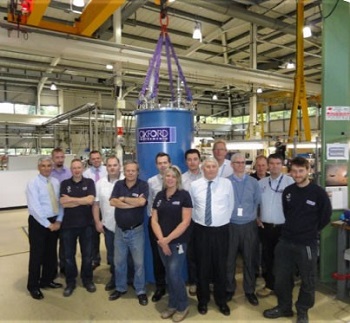Oxford Instruments is pleased to announce that its high field magnet system recently commissioned at the National High Magnetic Field Laboratory in Tallahassee, Florida (National MagLab) has been used in prototype testing that has already reached a new record high field: 27 Tesla in an all-superconducting magnet.
The so-called “outsert” magnet system from Oxford Instruments generates 15 T within a very large magnet bore of 250 mm, operating at 4.2 Kelvin. The additional 12 T came from high temperature superconducting (HTS) coils developed by the National MagLab. The 27 T result is a significant milestone on the way to the National MagLab’s goal of a 32 T all-superconducting magnet.

Achieving this high field in an all-superconducting magnet is a major step in high field user capability at the National MagLab. When the project is completed in 2016, the National MagLab’s 32 T magnet will be the world's most powerful superconducting magnet available to researchers. It will enable future-leading science, as well as removing the infrastructure requirements and costs associated with the resistive magnets typically used to generate magnetic fields greater than 30 T today.
The prototype HTS coils developed by National MagLab use 4 mm YBCO tape from SuperPower Inc. (Schenectady, NY) and were operated to 265 A in the full Oxford Instruments 15 T outsert magnet, for the combined magnet central field of 27 T at 4.2 K, the normal boiling point of liquid helium.
“This is the highest magnetic field reached in a fully superconducting system, and a world record indeed”, commented Dr Ziad Melhem, Alliances Manager at Oxford Instruments. “This further confirms Oxford Instruments’ world-class capability to develop state of the art high field superconducting magnet systems that are successfully used for such record-breaking projects, which will benefit researchers in both physical and life sciences for years to come”.
Read more at http://www.oxford-instruments.com/news/2015/april/oi-commisions-high-field-outsert-magnet-system and on MagLab’s website at https://nationalmaglab.org/news-events/news/maglab-claims-record-with-novel-superconducting-magnet.
Issued for and on behalf of Oxford Instruments NanoScience
About Oxford Instruments NanoScience
Oxford Instruments NanoScience designs, supplies and supports market-leading research tools that enable quantum technologies, new materials and device development in the physical sciences.
Our tools support research down to the atomic scale through creation of high performance, cryogen-free low temperature and magnetic environments, based upon our core technologies in low and ultra-low temperatures, high magnetic fields and system integration, with ever-increasing levels of experimental and measurement readiness. Oxford Instruments NanoScience is a part of the Oxford Instruments plc group.
About Oxford Instruments plc
Oxford Instruments designs, supplies and supports high-technology tools and systems with a focus on research and industrial applications. Innovation has been the driving force behind Oxford Instruments' growth and success for over 50 years, and its strategy is to effect the successful commercialisation of these ideas by bringing them to market in a timely and customer-focused fashion.
The first technology business to be spun out from Oxford University, Oxford Instruments is now a global company and is listed on the London Stock Exchange (OXIG). Its objective is to be the leading provider of new generation tools and systems for the research and industrial sectors with a focus on nanotechnology. Its key market sectors include nano-fabrication and nano-materials. The company’s strategy is to expand the business into the life sciences arena, where nanotechnology and biotechnology intersect
This involves the combination of core technologies in areas such as low temperature, high magnetic field and ultra high vacuum environments; Nuclear Magnetic Resonance; X-ray, electron, laser and optical based metrology; atomic force microscopy; optical imaging; advanced growth, deposition and etching.
Oxford Instruments aims to pursue responsible development and deeper understanding of our world through science and technology. Its products, expertise, and ideas address global issues such as energy, environment, security and health.